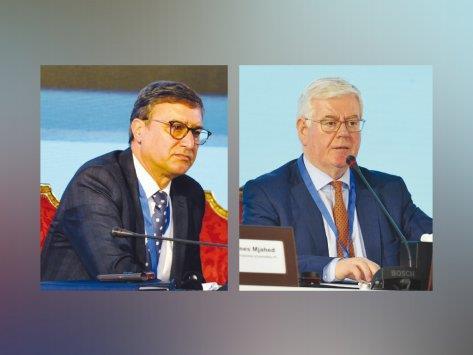
Qatar- Promoting pluralism vital to protecting right to freedom of expression
(MENAFN- The Peninsula) The United Nations High Commissioner for Human Rights, Michelle Bachelet, highlighted during her speech at the opening session of the International Conference on ‘Social Media: Challenges and Ways to Promote Freedoms and Protect Activists' the significant changes and developments that took place in the fields of media, press, and social media due to the digital revolution, considering them an important issue for those who felt isolated in the past.
The United Nations High Commissioner, who addressed the conference through video link, called for addressing all challenges facing freedom of social media and journalists and protecting activists. She added this is to build an effective partnerships and seize all opportunities to achieve the desired goals, and avoid repercussions.
She warned that data and information available through these media remain subject to surveillance and cyber attacks if their protection means were not improved, with the need to ensure that the relevant laws do not become vulnerable to defamation and counterfeiting.
Ending violations of human rights and the protection of civic space require the lifting restrictions and barriers of the media, the press, human rights organizations, and an active civil society and loud critical voices, Bachelet highlighted.
For his part Carlos Negret Mosquera, Chairman of the Global Alliance of National Human Rights Institutions (GANHRI) stressed during the opening session that human rights applied outside the Internet also apply to the content available online. States have the primary responsibility to respect, protect, promote and fulfil human rights and fundamental freedoms of internet users, he added. The Chairman of GANHRI praised the great role of the social media in widening the civic space, as it has become essential tools for advocacy and reporting activities.
The Chairman of the GANHRI urged the Alliance's next strategic plan to include civic space as a priority, while continuing to build the capacity of member institutions, promoting exchange of experiences and practices, and working with states, civil society organisations, United Nations partners and business communities.
Mosquera said promoting pluralism is vital to protecting the right to freedom of expression and social media has opened horizons for groups deprived from having their voices heard, joining public debates, and highlighting their role. He pointed that these social media tools and means will link people, and assist in exchanging experiences, directing criticism.
However, he said, new concerns have emerged, including promotion of terrorism or criminal activities, misinformation, or incitement to violence, and discrimination, prompting countries to try to regulate the use of digital technologies and social media to reduce violations of the right to privacy and guarantee freedom of expression, which highlights the role of private companies.
During same session the President of the International Federation of Journalists (IFJ), Younes Mjahed, stated that the new technologies in social communication contributed to the development of the democratic struggle, especially in countries where there is no free press or democratic experiences and institutions.
President of IFJ also warned against some governments resorting to repressive actions intended to limiting the spread of the news and ideas that contradict its policy, as well as the use of pressure and interests groups and the use of many techniques to mislead public opinion and spreading of propaganda and rumour.
Younes Mjahed said: 'We cannot accept the use of collateral damage, as a justification that allows some governments to back away from freedoms or to devote a policy of restricting them, calling on journalists, activists and officials in the organisations to play their pioneering roles in this regard.
In his speech, he highlighted the role of IFJ in protection of the rights of press unions, stressing that exercise of press freedom is an essential part of freedom of expression.

Legal Disclaimer:
MENAFN provides the
information “as is” without warranty of any kind. We do not accept
any responsibility or liability for the accuracy, content, images,
videos, licenses, completeness, legality, or reliability of the information
contained in this article. If you have any complaints or copyright
issues related to this article, kindly contact the provider above.


















Comments
No comment